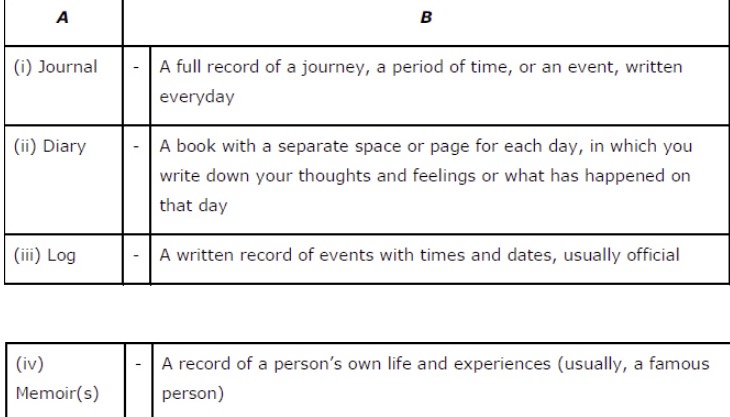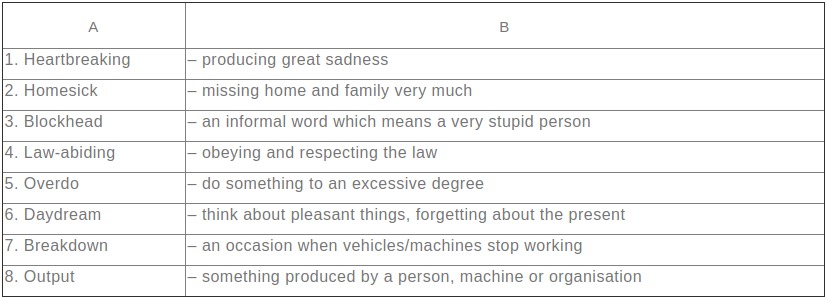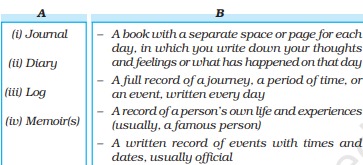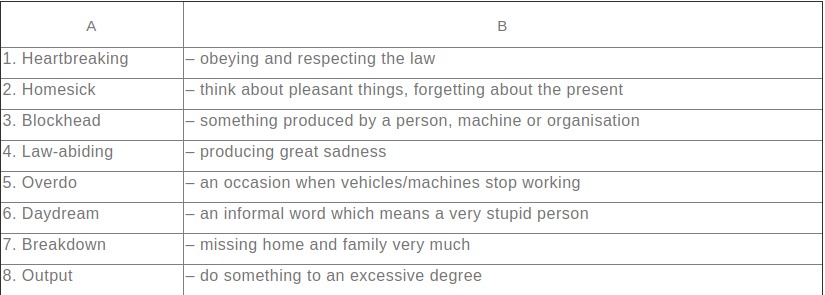From the Diary Of Anne Frank
Q.1: Do you keep a diary? Given below under ‘A’ are some terms we use to describe a written record of personal experience. Can you match them with their descriptions under ‘B’? (You may look up the terms in a dictionary if you wish.)
Ans :
Q.2: Here are some entries from personal records. Use the definitions above to decide which of the entries might be from a diary, a journal, a log or a memoir.
(i) I woke up very late today and promptly got a scolding from Mum! I can’t help it — how can I miss the FIFA World Cup matches?
(ii) 10:30 a.m. Went to the office of the Director
01:00 p.m. Had lunch with Chairman
05:45 p.m. Received Rahul at the airport
09:30 p.m. Dinner at home
(iii) The ride to Ooty was uneventful. We rested for a while every 50 km or so, and used the time to capture the magnificent landscape with my HandyCam. From Ooty we went on to Bangalore.
What a contrast! The noise and pollution of this once-beautiful city really broke my heart.
(iv) This is how Raj Kapoor found me — all wet and ragged outside R.K.Studios. He was then looking for just someone like this for a small role in Mera Naam Joker, and he cast me on the spot. The rest, as they say, is history!
Ans : (i) Diary (ii) Log (iii) Journal (iv) Memoir
Q.1: What makes writing in a diary a strange experience for Anne Frank?
Ans : Writing in a diary was a strange experience for Anne Frank as she never had a diary and it was a gift on her 13th birthday. She considered it her best friend on which she relied the most and with whom she shared all her ups and downs.
Q.2: Why does Anne want to keep a diary?
Ans : Anne always feels lonely and distressed so to get off all the burden and pain she wants to keep a diary in which she finds a true friend as she has hardly any friends whom she could confide in.
Q.3: Why did Anne think she could confide more in her diary than in people?
Ans : Anne felt that paper had more patience than people to listen to her plight. So, it was easier for her to write all kind of thoughts which she had in her mind. Her personal diary was not meant for any one else to read.
Q.1: Why does Anne provide a brief sketch of her life?
Ans : Even though she disliked doing so, Anne provides a brief sketch of her life since no one would understand a word of her musings if she were to jump right in.
Q.2: What tells you that Anne loved her grandmother?
Ans : Anne's grandmother had fallen ill and had to be operated upon. Therefore, Anne's birthday passed with little celebration. Her grandmother died the next year. Anne wrote in her diary that no one knew how often She thought of her grandmother and still loved her.
Q.1: Why was Mr Keesing annoyed with Anne? What did he ask her to do?
Ans : Mr Keesing was annoyed with Anne because she was very talkative. He punished her by giving her extra homework to write essays to keep her silent and the topics always related to her nature.
Q.2: How did Anne justify her being a chatterbox in her essay?
Ans : Anne justified her being a chatterbox in her essay by explaining that it is due to her mother who was also very talkative and nobody could do anything about their inherited traits.
Q.3: Do you think Mr Keesing was a strict teacher?
Ans : No, Mr Keesing was not a bad or strict teacher because a teacher did something for the welfare of his students. Any teacher would be annoyed if children keep on talking in the class. Secondly, if he had been strict he would not have laughed at Anne's funny arguments.
Q.4: What made Mr Keesing allow Anne to talk in class?
Ans : Anne's last essay in the form of a poem showed Mr Keesing the lighter side of a naughty child It helped bridge the generation gap between the teacher and the student.
Q.1: Was Anne right when she said that the world would not be interested in the musings of a thirteen-year-old girl?
Ans : No, Anne was not right when she said that the world would not be interested in the musings of a thirteen year old girl. Her diary was published under the name 'The Diary of a young girl'. It was translated from its original Dutch into many languages and it became one of the world's most widely read books. There have also been several films, television and theatrical productions, and even an opera based on the diary. It was described as the work of a mature and insightful mind. It provides an intimate examination of life under Nazi occupation. Anne Frank became one of the most renowned and discussed of the Holocaust victims.
Q.2: There are some examples of diary or journal entries in the ‘Before You Read’ section.
Compare these with what Anne writes in her diary. What language was the diary originally written in? In what way is Anne’s diary different?
Ans : Anne's diary was originally written in Dutch. Her diary is different from the others in many aspects. She had named her diary 'Kitty'. She thought of it as her only true friend whom she could confide in. She treated it as another person who was listening to her daily accounts. She wrote all her stories in it. She started by writing 'Dearest kitty' and ended the account by writing, 'Yours, Anne'. Her diary was a lot more personal than other diaries.
Q.3: Why does Anne need to give a brief sketch about her family? Does she treat ‘Kitty’ as an insider or an outsider?
Ans : Anne gave a brief sketch of her life since no one would understand a word of her stories to her diary if she were to plunge right in. She, therefore, wrote a brief sketch of her life, even though she disliked doing so. She treated Kitty as an insider because she called it her best friend and was ready to confide in it.
Q.4: How does Anne feel about her father, her grandmother, Mrs Kuperus and Mr Keesing? What do these tell you about her?
Ans : Anne felt that her father was the most adorable father she had ever seen. Anne remembered her grandmother even after her death. She wrote in her diary that no one knew how often she thought of her grandmother and still loved her. In the sixth form at the Montessori nursery school, her teacher was Mrs Kuperus, who was also the headmistress. At the end of the year, they were both in tears as they said a heartbreaking farewell. Mr Keesing was her Maths teacher. He was annoyed with her because she talked too much. However, Anne was able to justify her talkative nature every time she was punished by Mr. Keesing. On each occasion he was impressed by the manner in which she presented her arguments. All these incidents show how lovable and smart Anne was. Everybody was attached to her, and even Mr Keesing could not help but laugh at her essays and acknowledge her smart mind.
Q.5: What does Anne write in her first essay?
Ans : In her first essay, titled 'A Chatterbox', Anne wanted to come up with convincing arguments to prove the necessity of talking. She began thinking about the subject. She wrote three pages and was satisfied. She argued that talking was a student's trait and that she would do her best to keep it under control. She further wrote that she would never be able to cure herself of the habit since her mother talked as much as she did. There was not much that one could do about inherited traits. Mr Keesing too had a good laugh reading her arguments.
Q.6: Anne says teachers are most unpredictable. Is Mr Keesing unpredictable? How?
Ans : Anne felt that a quarter of her class was dumb, and should be kept back and not promoted to the next class. However, she also felt that teachers were the most unpredictable creatures on earth. Mr Keesing could be termed as unpredictable. The way Anne always talked while the class was going on, any teacher would lose his temper. However, after several warnings, all Mr Keesing did was to assign her extra homework. She had to write an essay on 'A Chatterbox'. In this way, he tried to play a joke on her. Each time that he asked her to write such essays, she wrote very well. She kept countering his jokes. One could not have predicted that he would take all the jokes in the right spirit. Finally, he accepted her talkative nature and actually allowed her to talk in class. He did not even assign her any more extra homework. That iS Why it can be said that Mr Keesing was unpredictable.
Q.7: What do these statements tell you about Anne Frank as a person?
(i) We don’t seem to be able to get any closer, and that’s the problem. Maybe it’s my fault that we don’t confide in each other.
(ii) I don’t want to jot down the facts in this diary the way most people would, but I want the diary to be my friend.
(iii) Margot went to Holland in December, and I followed in February, when I was plunked down on the table as a birthday present for Margot.
(iv) If you ask me, there are so many dummies that about a quarter of the class should be kept back, but teachers are the most unpredictable creatures on earth.
(v) Anyone could ramble on and leave big spaces between the words, but the trick was to come up with convincing arguments to prove the necessity of talking.
Ans : (i) These lines show that Anne had no true friend whom she could confide in. She even put the blame on herself that the fault might be hers. (ii) This line shows that Anne really considered her diary as a friend whom she could trust and narrate all her stories to. She did not want just a diary in which she could write down the facts like others did. She considered it as her friend and named her Kitty. (iii) This statement shows that Anne was a fun-loving person. She was witty and knew how to present things in a funny way. She narrated this incident with a lot of fun. The use of 'plunked down' shows her sense of humour. (iv) This statement shows that she had an opinion on everything. She thought that a quarter of her class was full of dummies, signifying that she herself was intelligent enough to make it to the next class. She thought of teachers as the most unpredictable creatures on earth because nobody could say which students they would fail and which students would be passed on to the next class. (v) This statement shows that Anne knew a lot about writing. She was given the task of writing an essay as a punishment. She took it on with full vigour. She did not want to write it like others who merely left big spaces between the words to make the essay look voluminous. She knew that the trick was to come up with a convincing argument to prove the necessity of talking. She was different in her approach from everybody else.
Q.1: Match the compound words under ‘A’ with their meanings under ‘B’. Use each in a sentence.
Ans :
Q.1: How old do you think Amanda is? How do you know this?
Ans : Amanda is about a 9-10 year old school going girl. She is being scolded for things typical for that particular age. Her parents are trying to inculcate in her good manners and etiquettes. Amanda is very innocent and immature.
Q.2: Who do you think is speaking to her?
Ans : One of her parents is speaking to her. Most probably it is her mother. In a traditional household mother is held responsible for the conduct of child. In this case also, the range of instructions suggests that the speaker is Amanda's mother.
Q.3: Why are Stanzas 2, 4 and 6 given in parenthesis?
Ans : Stanzas 2, 4 and 6 are given in parenthesis because they reflect the inner thoughts of Amanda They can be taken as the reaction of the child for the instructions given in stanzas 1, 3 and 5. Here, there is an alternate sequence of scolding of the mother, and corresponding reaction to it given by the child. Also, parenthesis is used here to make the reading of ' the poem friendly
Q.4: Who is the speaker in Stanzas 2, 4 and 6? Do you think this speaker is listening to the speaker in Stanzas 1, 3, 5, and 7?
Ans : Speaker of the stanzas 2, 4 and 6 is the child, Amanda. No, she is not paying any attention to the speaker of stanzas 1, 3 and 5 as she is lost in a world of her own. Her imagination provides her an escape from her sorry reality.
Q.5: What could Amanda do if she were a mermaid?
Ans : Amanda wishes to be a mermaid so she could carelessly move along on a languid emerald sea. She just wishes to be carried away by the green sea waves slowly and gradually. Amanda longs for a place where she is all by herself as her happiness is not dependant on any other human being. Hence, she desires to be a mermaid because for a child, mermaid is a symbol of freedom and wonder.
Q.6: Is Amanda an orphan? Why does she say so?
Ans : No, Amanda is not an orphan, though she wishes to be one She is so much stressed with the continuous nagging of her parents that she imagines herself to be better without them. The mere presence of her parents around her depresses her. Amanda is a little girl who seeks 'golden' silence and 'sweet' freedom. She wishes to roam around streets and draw patterns with her bare feet Indeed it is horribly depressing that Amanda expects being an orphan.
Q.7: Do you know the story of Rapunzel? Why does she want to be Rapunzel?
Ans : Story of Rapunzel — Rapunzel's story revolves around her life on a tower Rapunzel was made to live on a high tower by a witch. She eventually got used to living there. She was happy and satisfied with her life Rapunzel had very long golden hair, using which the witch used to pay her a visit. The fate of Rapunzel took a turn when one day a prince came to meet her using her hair. The witch had punished both of them by separating them. Finally they met after a couple of years only to be united forever this time. Amanda Wishes to live like Rapunzel on a high tower away from everyone She seeks peace and harmony. That is the reason Amanda wishes to be like Rapunzel. However, she also makes a point that in order to avoid being disturbed she would never let her hair down for anyone to climb to her. She needs no one to make her life happy.
Q.8: What does the girl yearn for? What does this poem tell you about Amanda?
Ans : A girl like Amanda yearns for freedom and space for herself. She is incapable to fulfil the expectations of her parents. Amanda is no less than a symbol for all the children who face similar fate irrespective of class, colour or nationality Traditional societies demand a certain type of behaviour from the individuals and the training to produce such begins at a very young age. Parents ignore the innocence and understanding level of their children and thereby the young ends up killing their imagination and thoughts.
Q.9: Read the last stanza. Do you think Amanda is sulking and is moody?
Ans : No, Amanda is neither sulking nor moody. She is simply not interested enough in the nagging business of her parents. Amanda cares more about her imagination and thought process over the manners her parents are trying to inculcate into her.


No comments:
Post a Comment